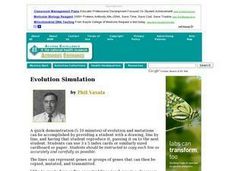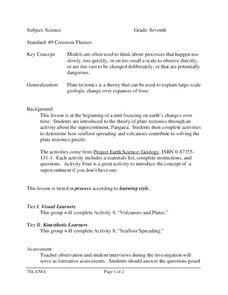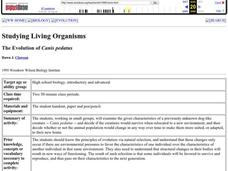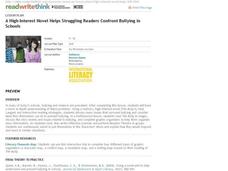Curated OER
Breeding Bunnies
Students learn the impact that genetics can have on the evolution of a population of organisms and become aware of the influence that the environment has onorganisms.
Curated OER
Evolution Simulation
Students simulate the process of evolution. Using index cards, they copy a drawing. Each subsequent drawing is sent around the room. The results are compared to the original drawing.
Curated OER
Using A Winogradsky Column to Analyze Microbial Communities
Students use easily obtained materials to study ecological succession in a microbiological community. This investigation is appropriate for a variety of age groups. Elementary Students be fascinated by the changes occurring over time...
Curated OER
Beat the Greeks
Learners conduct research of the history of atomic theory. Information is presented from Democritus and Aristotle to the early Renaissance using the Internet and video.The integration of technology allows for a vast amount of research...
Curated OER
Global Awareness
Students read about how scientists are arriving at current theories of human origin and migration through mitochondrial DNA analysis. They then piece together a map showing the data from mitochondrial DNA analysis to plot the migration...
Curated OER
Science
Seventh graders study the theory of plate tectonics. In this activity instructional activity students complete an activity to determine how seafloor spreading and volcanoes contribute to solving the plate tectonics...
Curated OER
The Vocabulary of Space
Students build their knowledge and understanding of vocabulary related to space. In this space instructional activity, students discuss four categories of words and phrases related to space.
Curated OER
What's That Brown Fuzzy Stuff On My Plum?
Learners examine Koch's Postulates by actually using them. They perform each of the required four steps to show that the brown fuzzy fungus they see growing on stone fruit (plums, peaches, nectarines, cherries) is what causes them to rot.
Curated OER
Decision Day
Learners participate in a role play activity that emphasizes the theory behind the Electoral College. They form small groups of different sizes in order to present a candidate for class president. Finally, they use a map to determine the...
Curated OER
Hokule'a: the Scientific Method in Action
Students, in groups, research the four main theories of Polynesian settlement. They review these hypotheses, research any conducted experiments and present their findings to the class in a creative way.
Curated OER
Thanksgiving: Bird Evolution
Learners explore the evolution of birds. In this biology lesson, students research articles that discuss evidence about the ancestry of birds. They discuss their findings with the group and draw a journal magazine cover highlighting...
Curated OER
The Evolution of Canis pedatus
Students examine the given characteristics of a previously unknown dog-like creature, Canis pedatus, to decide if the creatures would survive when relocated to a new environment. They work in small groups to decide whether or not the...
Curated OER
The Evolution of Canis pedatus
Pupils, in groups, examine the given characteristics of a previously unknown dog-like creature, Canis pedatus. They discuss whether or not this species would show adaptations and survive if it were relocated to a new environment.
Curated OER
What Killed the Dinosaurs?
Young scholars demonstrate how scientists use evidence to formulate hypotheses. They write an essay describing the Cretaceous and Paleocene time periods from the point of view of someone living in that time. In addition, they formulate...
Curated OER
Comparative Embryology Using Japanese Medaka Fish
Students conduct an experiment to control the breeding of Japanese Medaka fish. They collect the fertilized eggs and view and record the fish's embryological development daily to compare the stages to human development.
Curated OER
Bermuda: Search for Deep Water Caves 2009: Out of Darkness
Students analyze the three models on the origin of troglobitic fauna. For this life science lesson, students also consider how the Zonation model explains the fauna's origin. They also use the Internet to research solutional and volcanic...
Glynn County School System
The Moon
People may not be able to jump over the moon, but scientists can still study it! The moon is covered with mons (mountains) and mars (seas). Aspiring astrologists learn about the moon's features and phases in a PowerPoint presentation. In...
Curated OER
Models of Succession
Students create a model city in order to understand the effects human habitats have on the environment. In this environment lesson, students examine the effects human habitats have on the environment. Students create a model...
Illustrative Mathematics
Waiting Times
Probability prevails in this assignment as youngsters determine the probability of finding a blue pen in a cereal box when they can come in blue, green, yellow, or red. Learners set up a simulation to determine the outcome of compound...
ReadWriteThink
Literature Circles: Getting Started
Make reading more enjoyable and interactive with literature circles! Here you'll find detailed lessons to begin the literature circle process. Ten lessons introduce each role learners take on. Literature circle roles include...
Curated OER
The Water Cycle
Fifth graders explore the major components of the water cycle. They pay close attention to evaporation, condensation, and precipitation. A water cycle kit is set up in the classroom, which learners observe for a couple of days before the...
Curated OER
Characterization of the Bioluminescence (Lux+) Gene E. coli
Students grow E. coli strain HB101, which contains the plasmid pUCD607 with the bioluminescence (Lux+) gene. The plasmid containing the Lux+ gene is isolated from the E. coli, then characterized by restriction analysis.
ReadWriteThink
A High-Interest Novel Helps Struggling Readers Confront Bullying in Schools
Paul Langan's novel The Bully is the core text in a six-session unit plan that engages high schoolers in an in-depth examination of bullying and its effects on bullies, victims, and bystanders. The richly textured and carefully...
Montana State University
Sea Floor to Summit
Who knew that mountain formation could be so entertaining? Leanr how mountains form with a resource on Mount Everest. Activities to guide learning include a simulation, project, videos, coloring activities, and worksheets.

























